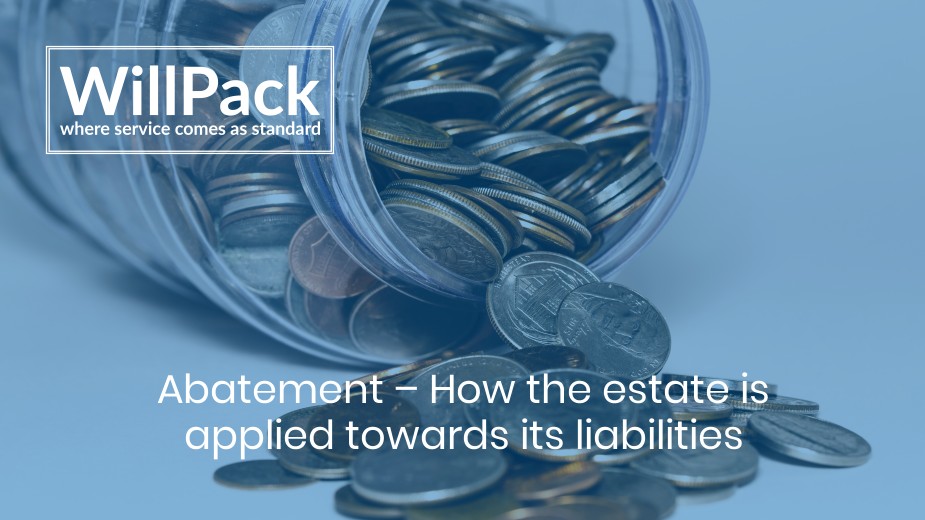Where a deceased’s estate is not able to meet all liabilities and expenses, all gifts in the Will fail, as all their estate will be needed to meet the estate’s liabilities.
Where the estate is solvent and able to meet all its liabilities, there is a certain order in which assets will be applied towards the liabilities. This order is known as abatement.
Types of Gifts
In order to understand the order of Abatement, it is important to understand the different types of gifts that can be made by a Will.
Specific gifts are gifts of some particular identifiable possession or item that is a distinguishable part of the Testator’s estate. Examples of specific gifts include gifts of chattels, jewellery or real property. Including any words that indicate possession shows a clear intention that a gift is to be specific.
General gifts are gifts not of a precise thing that is owned by the Testator, it is more an instruction for something to be provided out of the Testator’s general estate. Whether or not that gift is actually part of the estate at death is irrelevant. A gift of money will nearly always be a general gift. A Testator leaving a gift of £1000 may not have such cash in their estate. Their executors must raise the money to make such a gift.
Demonstrative gifts are a hybrid of the specific and general gifts. It is essentially a general gift that has to be satisfied from a particular source, for example £2000 from my bank account held with RBS.
If the specified fund is not large enough to make the gift in full, any excess would be made out of the general estate and treated as a general gift. Using the above example, if there is only £1500 in the specified RBS account at the Testator’s death, the remaining £500 will be treated as a general gift.
Abatement of a Solvent Estate
Where the estate is solvent, the order in which assets are used to cover liabilities is covered by the First Schedule of the Administration of Estates Act 1925.
The main concerns from this order is as follows:
- Assets in the Residuary Estate are firstly used to pay towards the liabilities, each person’s share in the Residuary Estate will be reduced rateably.
- If the Residuary Estate is not large enough to cover liabilities, any general gifts shall then also be used, each general gift will be reduced rateably.
- If the general gifts are also not enough to cover liabilities then specific gifts will have to be used, these will again be reduced rateably.
This statutory order can be varied, for example it can be stated that a certain gift shall have priority over all other gifts.
For the purposes of this order, demonstrative gifts are treated as if they are specific so far as they can be satisfied out of their specific fund. Anything that cannot be satisfied shall be treated as a general gift.
When drafting wills, we should have Abatement in mind. There is a temptation at times for clients to want to specifically gift most of the assets in their estate, leaving little or no residue. Doing this is unadvisable, as it would likely cause Abatement of the specific gifts in order for the estate’s liabilities to be paid.
Abatement Scenario
Abatement of a solvent estate in practice is best Illustrated in a scenario.
Mr Jones provides the following in his Will:
- His House and his chattels are gifted to his wife Mrs Jones.
- £10,000 from his account held with RBS is gifted to RSPCA.
- £5000 is gifted to each of his three siblings.
- The Residuary Estate is passed to his daughter.
At his Death, Mr Jones’ estate is worth £130,000:
- House: £95,000.
- Chattels: £5,000.
- RBS Account: £8,000.
- Other Assets: £22,000.
Mr Jones has no debts and all funeral expenses were covered by a funeral plan.
Mr Jones specific gifts should be made first:
- Mrs Jones receives the house and chattels
- RSPCA receives the £8,000 in the RBS account
This leaves £22,000. The general gifts should then be made:
- The remaining £2,000 to RSPCA
- Each sibling receives £5,000
This leaves a remaining £5,000 to his daughter.
Now consider the same scenario, but instead of dying debt free, Mr Jones has debts of £15,000.
The Residue (£5,000) is used towards these first, leaving his daughter with nothing. Mr Jones’ general gifts (worth £17,000) shall have to be used to pay the remaining £10,000 debts. This leaves £7,000, meaning the general gifts will all have to be reduced accordingly.
There is a simple calculation to work out the abated value of a gift:
| Value of the remaining assets | x | Value of the gift | = | Abated value |
| Total value of that class of gifts (in this case general gifts) |
This can be used to work out the abated values of the £2,000 to RSPCA and each siblings gift of £5,000.
| £7,000 | x | £2,000 | = | £823.53 |
| £17,000 |
This means that the reduced value of the RSPCA’s £2,000 is £823.53
| £7,000 | x | £5,000 | = | £2,058.82 |
| £17,000 |
This means that the reduced value of each sibling’s £5,000 is £2058.82
The specific gifts are made without any reductions, meaning Mrs Jones receives both the house and the Chattels and the RSPCA receives the £8000 in the RBS account (meaning they receive a total of £8823.53).


 © Trust Wills & Probate Limited t/a WillPack. All rights reserved.
© Trust Wills & Probate Limited t/a WillPack. All rights reserved.
You must be logged in to post a comment.